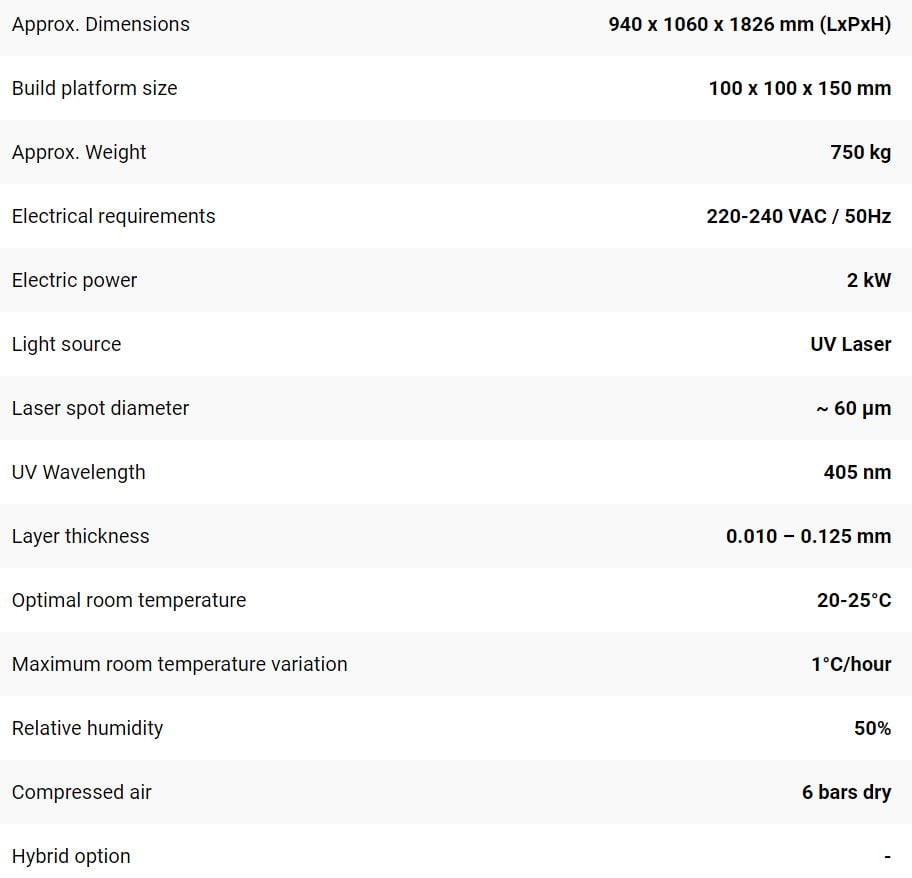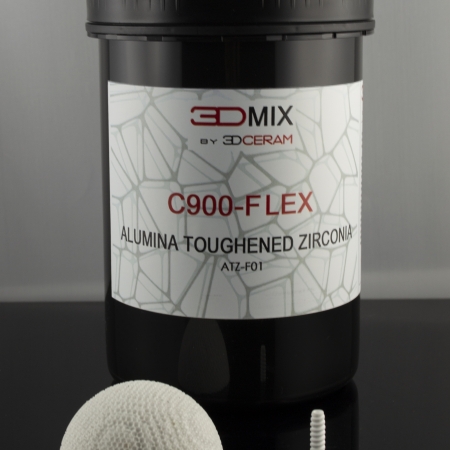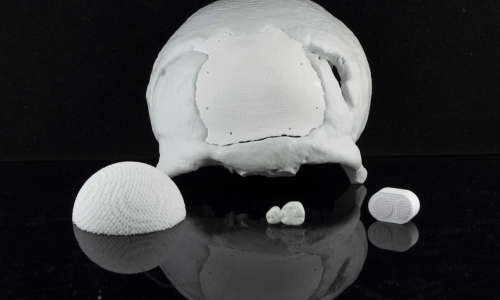

C100 EASY FAB
The 3D printer to develop & prototype then scale up on the C3600 ULTIMATE
- C100 EASY FAB
- Materials
- Ceramics
C100 EASY FAB
The 3D printer to develop & prototype then scale up on the C3600 ULTIMATE
• User friendly
• Lab Mode for free development
• Stereolithography laser
• Free link support technology
• A pressure tank (1,5 liter) feeding to provide the material quantity required for an optimized run 100*100*150
• Accurate control of the quantity of slurry thanks to the peristaltic pump
• Accessible for persons with reduced mobility
• Easy scale up to C3600 (600 x 600 x 300 mm)



Stereolithography, a technology without support
Top-down stereolithography enables technology that can print without supports. The tray moves down as the part itself is built from the bottom-up. 3DCeram is able produce consistent parts with high precision and fine details.
The feeding of the printing material is done by a printing material is fed into a cartridge which is simply filled at the beginning of the printing cycle. It is possible to re-fill the cartridge during the printing cycle.
3DCeram has a wide selection of ceramics developed for use with the C100 EASY printer.
The materials are able to obtain homogenous layers for maximum quality in final products. They guarantee a level of quality recognized by the most demanding industries.
3Dceram offers a catalogue of ceramics developed for specific needs


Zirconia : ZrO2, material with the very good mechanical properties cold. It is able to be colored for jewelry applications, it has excellent mechanical properties at high temperatures, weak thermal conductivity at room temperature, conductor in T> 1000°C, great hardness, good wear resistance.
Alumina : ZrO2, material with the very good mechanical properties cold. It is able to be colored for jewelry applications, it has excellent mechanical properties at high temperatures, weak thermal conductivity at room temperature, conductor in T> 1000°C, great hardness, good wear resistance.
Silicon Nitride (Si3N4) : Silicon nitride is among the hardest and most resistant technical ceramics. It has also highly resistant to thermal shocks, wear, and corrosion (liquid and gas). Some applications are in pump and valve components, semiconductors, among others

Ready-to-use ceramic paste
Formulation of paste on request:
• possibility to use your own ceramic,
• Definition of the printing and firing parameters specific to the formulation,
• Keep the benefit of your certification.
The qualities of ceramic are well known: high strength, high dimensional stability (low coefficient of thermal expansion), low density, high resistance to abrasion and corrosion, exceptional chemical stability… In order to help you grasp the best of it, 3DCeram advises you on the selection of a ceramic that meets your specifications.
These pastes developed to fit the CERAMAKER 3D printers are used daily in the 3DCeram workshop by the production-on-demand service. Their technical characteristics enable a regular supply of the printer and allow to obtain homogeneous layers for a maximum quality of the products.
They guarantee a level of quality preferred by the most demanding industries.
3DCERAM offers several types of ceramics formulated to be printed with the CERAMAKER printer.


Customer-specific ceramic formulation service
3DCeram develops on demand formulations of ceramic pastes, based on several years of R & D in the field of ceramics for 3D printing.
3DMIX allows you to benefit from a true support of expertise for the ceramics. Because technical ceramics is our profession, our engineers determine the ceramic formulations adapted to your needs, according to the characteristics to be obtained.
Definition of technical ceramic
The ceramic materials are neither organic, nor metallic. They are generally formatted at ambient temperature and obtain their specific properties during a process of “sintering”, i.e. the consolidation of material obtained at high temperature.
Therefore, technical ceramics are the items made through this process and generally designated for the particularly demanding industrial fields. Thanks to their distinctive properties (stainless, insulating, and resistant to heat and wear), technical ceramics are also used in biomedical applications, luxury market…
The choice of ceramic material constituting the item to be produced, is governed by the constraints the object in question will be subjected to.among the hardest and most resistant technical ceramics. It has also highly resistant to thermal shocks, wear, and corrosion (liquid and gas). Some applications are in pump and valve components, semiconductors, among others
Alumina

Al2O3, basic material being useful in many applications for technical ceramics, good mechanical behavior in the high temperatures, the good thermal conductivity, the big electric resistivity, the great hardness, the good wear resistance, the chemical slowness.
Zirconia

ZrO2, material with the very good mechanical properties cold, being able to be colored for applications in jewelry, excellent mechanical properties in the high temperatures, the weak thermal conductivity at room temperature, conductor in T> 1000°C, great hardness, good wear resistance, good chemical slowness, good resistance in the attacks of metals.
Silicore

Silicore is a ceramic formulation specifically developed for foundry cores. It is formulated on a silica basis and has a high mechanical resistance. It is a porous ceramic enhanced the leachability even when it comes to complex shapes.
• Good mechanical strength
• Good thermal conductivity
• High electrical resistivity
• High hardness
• Good wear resistant
• Chemically inert
• Electric Insulators
• Laboratory devices
• Telecommunication equipment
• Electronical Devices
• Spatial
• Foundry Cores
• Optical Instruments
• Excellent mechanical properties
• Chemical inertness
• High Hardness
• Jewerly
• Watches
• Biomédical devices
• Biomedical implants
• Electronic equipment
• High mechanical resistance
• Porous ceramic, good leachability
• Very stable at high temperature
• Compatible with complex shapes like cores
• Used with all alloys except cobalt
• Foundry Cores
Alumina Toughened Zirconia

Alumina Toughened Zirconia, known for their biocompatibility and their resistance to wear and thermal shock, are recommended for biomedical and industry applications.
The ceramic ATZ combines both Alumina (20%) and Zirconia (80%) ceramics in one. The mix of these two combined offers several properties
Cordierite

This low CTE and thermal conductivity ceramic is wear resistant. It suits vacuum application.
Zirconia 8Y

8 mol% yttria-stabilized zirconia is mainly developed for fuel cell applications.
• Great Hardness and tenacity
• Biocompatibility
• Resistance to wear and thermal shock
• Implants
• Teeth
• Wear resistant parts
• Low CTE (Coefficient of Thermal Expansion)
• Low thermal conductivity
• Wear Resistant
• Good for vacuum application
• Optical parts for aerospace
• Metrology
• Ionic conductivity
• Oxygen-ion conductivity
• Heat insulating
• Fuel Cell
TCP

TCP or Tricalcium Phosphate is a material often used for implants in the medical field, especially to recreate parts close to the structure of a spine
Silice SiO2

Silice ceramics suit foundry cores and optical applications requirements.
HAP

Hydroxyapatite/TCP: material used in the biomedical applications for the manufacture of the osseous substitutes, chemical composition close to bone.
• Biocompatible
• Bioresorbable
• Implants
• Good leachability
• Foundry Cores
• Biocompatibility
• Excellent bioactivity
• Good osseointegration
• Tibial osteotomy wedges
• Intervertebral cages
• Cranial implants
• Bone substitute
• Spine implants
• Orthopedic implants
Silicon Nitride
The Silicon Nitride is among the hardest and most resistant technical ceramics. It has also a high resistance to thermal shocks, to wear and corrosion (liquid and gas). Its application is found in the components of pumps and valves, semiconductors among others.
Aluminium Nitride

The high mechanical properties of this ceramic, combined with high thermal conductivity and electrical insulation, are highly recommended in electronics industry.
• Good resistance to thermal shocks
• Good resistance to wear
• Mechanical properties
• Low wettability against molten metals
• Good electrical insulation
• Resistance to corrosion (liquid and gas)
• Semi conductor
• Heating tubes
• Pump and Valves components
• High thermal conductivity
• Electrical insulation
• Good mechanical strength
• Electronics Industry
- Oxide Ceramics
- Non Oxide Ceramics
Alumina

Al2O3, basic material being useful in many applications for technical ceramics, good mechanical behavior in the high temperatures, the good thermal conductivity, the big electric resistivity, the great hardness, the good wear resistance, the chemical slowness.
Zirconia

ZrO2, material with the very good mechanical properties cold, being able to be colored for applications in jewelry, excellent mechanical properties in the high temperatures, the weak thermal conductivity at room temperature, conductor in T> 1000°C, great hardness, good wear resistance, good chemical slowness, good resistance in the attacks of metals.
Silicore

Silicore is a ceramic formulation specifically developed for foundry cores. It is formulated on a silica basis and has a high mechanical resistance. It is a porous ceramic enhanced the leachability even when it comes to complex shapes.
• Good mechanical strength
• Good thermal conductivity
• High electrical resistivity
• High hardness
• Good wear resistant
• Chemically inert
• Electric Insulators
• Laboratory devices
• Telecommunication equipment
• Electronical Devices
• Spatial
• Foundry Cores
• Optical Instruments
• Excellent mechanical properties
• Chemical inertness
• High Hardness
• Jewerly
• Watches
• Biomédical devices
• Biomedical implants
• Electronic equipment
• High mechanical resistance
• Porous ceramic, good leachability
• Very stable at high temperature
• Compatible with complex shapes like cores
• Used with all alloys except cobalt
• Foundry Cores
Alumina Toughened Zirconia

Alumina Toughened Zirconia, known for their biocompatibility and their resistance to wear and thermal shock, are recommended for biomedical and industry applications.
The ceramic ATZ combines both Alumina (20%) and Zirconia (80%) ceramics in one. The mix of these two combined offers several properties
Cordierite

This low CTE and thermal conductivity ceramic is wear resistant. It suits vacuum application.
Zirconia 8Y

8 mol% yttria-stabilized zirconia is mainly developed for fuel cell applications.
• Great Hardness and tenacity
• Biocompatibility
• Resistance to wear and thermal shock
• Implants
• Teeth
• Wear resistant parts
• Low CTE (Coefficient of Thermal Expansion)
• Low thermal conductivity
• Wear Resistant
• Good for vacuum application
• Optical parts for aerospace
• Metrology
• Ionic conductivity
• Oxygen-ion conductivity
• Heat insulating
• Fuel Cell
TCP

TCP or Tricalcium Phosphate is a material often used for implants in the medical field, especially to recreate parts close to the structure of a spine
Silice SiO2

Silice ceramics suit foundry cores and optical applications requirements.
HAP

Hydroxyapatite/TCP: material used in the biomedical applications for the manufacture of the osseous substitutes, chemical composition close to bone.
• Biocompatible
• Bioresorbable
• Implants
• Good leachability
• Foundry Cores
• Biocompatibility
• Excellent bioactivity
• Good osseointegration
• Tibial osteotomy wedges
• Intervertebral cages
• Cranial implants
• Bone substitute
• Spine implants
• Orthopedic implants
Silicon Nitride
The Silicon Nitride is among the hardest and most resistant technical ceramics. It has also a high resistance to thermal shocks, to wear and corrosion (liquid and gas). Its application is found in the components of pumps and valves, semiconductors among others.
Aluminium Nitride

The high mechanical properties of this ceramic, combined with high thermal conductivity and electrical insulation, are highly recommended in electronics industry.
• Good resistance to thermal shocks
• Good resistance to wear
• Mechanical properties
• Low wettability against molten metals
• Good electrical insulation
• Resistance to corrosion (liquid and gas)
• Semi conductor
• Heating tubes
• Pump and Valves components
• High thermal conductivity
• Electrical insulation
• Good mechanical strength
• Electronics Industry

